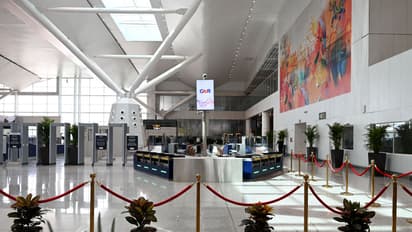7.7 km, 4 key stops, seamless connectivity & more: Delhi airport to get India's 1st 'air train' by 2027

Synopsis
The proposed APM will feature four key stops: T2/3, T1, Aerocity, and Cargo City, spanning a total route length of approximately 7.7 kilometers.
Transiting between Delhi International Airport's Terminal 3 and Terminal 2 on one side, and Terminal 1 on the other, is set to become significantly more convenient before the end of 2027. According to a Times of India report, the Delhi International Airport Limited (DIAL) has officially issued a tender for the construction of an automated people mover (APM), commonly referred to as an air train, which will connect the airport terminals and several key locations.
The proposed APM will feature four key stops: T2/3, T1, Aerocity, and Cargo City, spanning a total route length of approximately 7.7 kilometers. Once operational, the air train will eliminate the need for lengthy transfers via DTC buses between the airport’s distant terminals. According to the report, DIAL is expected to receive bids for this groundbreaking project in October and November, with the selection of a winning bidder based on cost proposals and revenue-sharing models.
"If all goes well, the contract will be awarded before the end of this fiscal year. Construction is targeted to be completed by the end of calendar year 2027, as communicated to the Union aviation ministry by DIAL," a source told the publication.
The tender document outlines DIAL's intention to implement the APM system using a design, build, finance, operate, and transfer (DBFOT) model. The project aims to provide fast, reliable, and seamless connectivity between the terminals, enhancing passenger convenience and improving the airport's Airport Service Quality (ASQ) score while also contributing to a reduction in carbon footprint.
The aviation ministry, under the current administration, has reportedly made it clear that no development fees will be levied to fund this project until it is completed. While the total cost of the air train has not been disclosed—leaving it to bidders to evaluate—the preliminary estimates suggest it could be under Rs 2,000 crore.
The government has previously advised DIAL to reconsider its initial plan, which included six stops for the proposed air train. Officials argued that such an extensive plan would prolong travel times between terminals and necessitate stringent security measures at non-terminal stops. The modified plan focuses on achieving a more efficient transit experience.
As per the TOI report, a senior government official noted last November, "DIAL's model for having so many stops, including two at Aerocity, will not only increase travel time between T1 and T2/3 but will also require foolproof security at non-terminal stops."
Delhi Airport, currently India's busiest hub, handles over 70 million passengers annually. With plans to double its capacity to over 130 million in the next 6-8 years, the implementation of an air train is crucial for managing this projected increase in passenger traffic. It is estimated that around 25% of travelers at Indira Gandhi International Airport (IGIA) will be transit flyers, underscoring the necessity for seamless transfers between terminals.
Globally, air trains are typically free for passengers to ensure smooth transit, with costs for enhancing airport infrastructure recovered through aeronautical charges set by the Airports Economic Regulatory Authority (AERA). For instance, at Mumbai Airport, a UDF (User Development Fee) component previously included a metro charge of Rs 20 for domestic and Rs 120 for international departures, which was in place until February 2023.
Stay updated with the Breaking News Today and Latest News from across India and around the world. Get real-time updates, in-depth analysis, and comprehensive coverage of India News, World News, Indian Defence News, Kerala News, and Karnataka News. From politics to current affairs, follow every major story as it unfolds. Get real-time updates from IMD on major cities weather forecasts, including Rain alerts, Cyclone warnings, and temperature trends. Download the Asianet News Official App from the Android Play Store and iPhone App Store for accurate and timely news updates anytime, anywhere.